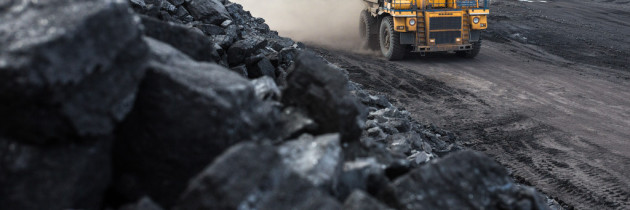Deutsche Bank Pulls Back from Deals in Coal Mining Sector
Pressured by environmentalists and worried about big losses from a troubled industry, many large banks and other lenders have made a hasty retreat from coal mining in recent years. But even in these dark times, there was one bank that many coal miners could still count on for financing and advice: Deutsche Bank.
Not any longer.
The German banking giant is pulling back from the embattled coal sector, another sign of the increasing risks for banks that finance industries that contribute to climate change.
Last week, six senior members of Deutsche Bank’s metals and mining investment banking team, which was responsible for overseeing deals in the coal industry, said they were decamping for Jefferies, a smaller, scrappy New York investment bank that has a knack for scooping up investment bankers who increasingly feel out of place at larger, more heavily scrutinized global banks.
A Deutsche Bank spokeswoman declined to comment on the bankers’ exodus. But industry analysts said the move was partly related to Deutsche Bank’s decision to back away from working on certain coal projects.
Deutsche Bank has no immediate plans to replace the six bankers, who helped the German bank secure the largest market share of metals and mining revenue in the Americas among banks last year. That ranking was up from sixth place in 2011, when many of them joined Deutsche from the Swiss banking rival UBS.
Dan Chu, a prominent coal banker at Deutsche Bank, will be global head of metals and mining investment banking at Jefferies.
“The large banks are under significant pressure from environmental groups to limit their activity in fossil fuels and mining across the board,” said Ted O’Brien, chief executive of Doyle Trading Consultants, which focuses on the coal sector. “This move might reflect an investment banking team that was no longer that important to a large bank and that will now be able to practice their niche under somewhat less scrutiny.”
Once a precious and sought-after resource, coal has fallen on hard times. Earlier this year, environmental groups like the Rainforest Action Network faulted Deutsche Bank for not going far enough in shunning coal.
Other large banks, including JPMorgan Chase and Bank of America, revised their policies to reflect a broader pullback from coal mining. Deutsche Bank had said that it would no longer finance so-called mountaintop removal projects, which involve extracting coal from the surface of mountains, often leaving large gashes in the landscape. But its public policy stopped short of the commitment to a broad retreat that many of the other large banks had made.
Banks are leaving coal for economic reasons, too. Just a few years ago, coal was surging, swept up in a global commodity craze, as mining companies sought to satisfy a seemingly insatiable demand from China.
As recently as 2011, the top 10 investment banks in the sector took in more than $1.6 billion in investment banking revenue from metals and mining deals globally, including coal deals. By 2015, that total had fallen to just $820 million, according to Dealogic.
The American coal industry, in particular, is now suffering a plague of bankruptcies. Power utilities are increasingly turning to cheap natural gas and renewable energy sources such as solar and wind to replace coal. Demand for coal from China has also cooled as its economy slows and the Chinese government tries to shift to cleaner energy sources.
In the first three months of the year, American coal production plummeted to the lowest levels in 35 years, in large part because the winter was so warm. And the spring brought no respite. May’s production of 50 million tons represented a 28 percent decline from May 2015, according to the Energy Department.
In recent days, Murray Energy, a coal giant based in Ohio, sent notices to its employees that said it could be forced to lay off 80 percent of its work force, or roughly 4,400 employees, across six states because of the widespread depression in the industry.
On Thursday, Alpha Natural Resources — which acquired the former Massey Energy in 2011 — received a judge’s approval to exit bankruptcy. As part of a deal in the bankruptcy with the Sierra Club and other environmental groups in West Virginia, Alpha agreed to give 53 million tons of its coal to a nonprofit group for the purpose of its never being mined or burned — a sign of just how little value this commodity holds at the moment.
As the coal industry undergoes what many analysts and investors expect to be a permanent downsizing, environmental groups have faulted Deutsche Bank for helping to sustain some life in the sector.
In recent years, Deutsche has assisted one of mining’s few durable operators, Blackhawk Mining, based in Lexington, Ky., which has been snapping up some of the best mines of bankrupt or nearly bankrupt companies such as Patriot Coal and Arch Coal.
Blackhawk declined to comment.
In more recent months, Deutsche Bank, which prides itself on being one of the top financiers of renewable energy projects in Europe, has taken a tougher stance against coal.
At the annual general meeting in May, Deutsche Bank executives said the bank would not expand its activities in the coal sector, adding to an earlier pledge to “phase out” debt and equity underwriting to companies that engage in mountaintop removal.
“Deutsche Bank supports a well-balanced overall energy mix that takes account of economic conditions as well as environmental and health and safety considerations,” a Deutsche Bank spokesman said in a statement.
Such considerations can go against the very grain of investment bankers, who are conditioned to work on as many deals as possible, not to cap activity.
Fonte: The New York times



